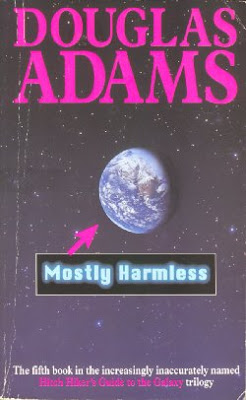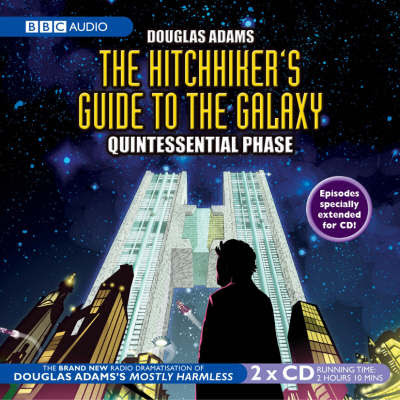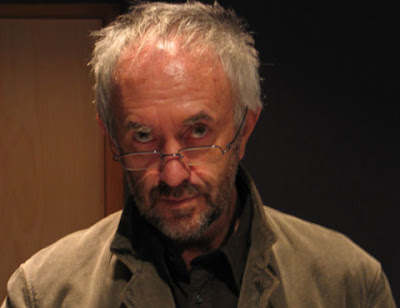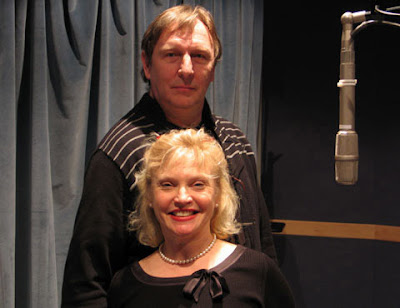
Nothing travels faster than the speed of light with the possible exception of bad news, which obeys its own special laws.
The Hingefreel people of Arkintoofle Minor did try to build spaceships that were powered by bad news but they didn't work particularly well and were so extremely unwelcome whenever they arrived anywhere that there wasn't really any point in being there.
And so opened the fifth and final book in the Hitchhiker trilogy.
Many fans dislike the final book, as fans dislike everything they love.
Douglas Adams, meanwhile, has always had a reputation for spewing forth the most incredible ideas and concepts, but also for having a great deal of trouble finding a story to fit them all into.
For example, Mostly Harmless spends the first three-quarters of the book getting started, after which it quickly finishes.
But the ideas contained therein are lovingly brainstormed gems, like….
Oddly, the man's face was now only a couple of feet away. He seemed in one way to be a perfectly normal shape, but his body was sitting cross-legged on a pole forty feet away while his face was only two feet from Arthur's. Without moving his head, and without seeming to do anything odd at all, he stood up and stepped on to the top of another pole. Either it was just the heat, thought Arthur, or space was a different shape for him.
…and…
‘Am I still infinite?' it asked, ballooning this way and that in space. `Am I infinite now? How yellow am I?'
Moment by moment the bird was going through mind-mangling transformations of shape and extent.
`I can't...' said Random bewildered.
`You don't have to answer, I can tell from watching you now. So. Am I your mother? Am I a rock? Do I seem huge, squishy and sinuously intertwined? No? How about now? Am I going backwards?'
…until finally…
’…in your universe you move freely in three dimensions that you call space. You move in a straight line in a fourth, which you call time, and stay rooted to one place in a fifth, which is the first fundamental of probability. After that it gets a bit complicated, and there's all sorts of stuff going on in dimensions 13 to 22 that you really wouldn't want to know about. All you really need to know for the moment is that the universe is a lot more complicated than you might think, even if you start from a position of thinking it's pretty complicated in the first place.’
By a staggering coincidence the phrase “pretty complicated in the first place” also only happens to be a perfect description of the history of The HitchHiker’s Guide To The Galaxy itself.
In the early 1980s, the story began as a radio series.
After the radio series had been novelised, author Douglas Adams continued the story in book form until his death in 2001. At this point radio producer Dirk Maggs adapted the remaining books for radio, and reassembled the original cast, 20 years older, to record them for transmission.

However, as Adams would revise and reorder events to make more logical sense, there was some disparity between the original radio series and the novelised book versions.
For example, the last original radio episode finished with Ford and Arthur being strung-along by a guy called Zarniwoop from the HHGG building.
However the next book in the series began with Ford and Arthur trapped for years on prehistoric Earth.
This is of course impossible.
And yet, that’s exactly the jump in storyline that the new series began with.
It gets worse – on radio, Ford and Arthur had already been through the prehistoric Earth storyline 5 episodes earlier.
It gets even worse - it was the late Douglas Adams’ own plan to ignore the last 5 episodes.
Oh dear, you can’t argue with that.
So Dirk Maggs’ compromise solution was to add-in a few throwaway lines at the start of the first new episode, writing off the last 5 episodes as just a dream.
As a result, subsequent episodes, though quite brilliant, nonetheless met with a bitter taste in my mouth. I was forced to choose which of the 2 contradictory sets of radio episodes were the ‘real’ ones.
The original series, of course, won.
Maggs picked up the production story in a BBC webchat on 22nd June 2005: (full transcript here.)
The changes in the Tertiary Phase were Douglas's in episodes 1 and 2 except the part where Trillian dismissed Zaphod's experiences in The Secondary Phase as a dream. Douglas was happy to just ignore the Secondary Phase as if it had never happened (because the books worked in a different way to the radio series, and these new series were based on the books), but I thought that as we were continuing the 'reality' created by the radio series we couldn't just ignore it. Episode One wasn't the right place in continuity to 'rescue' The Secondary Phase at that point but I was able to adapt the scene in the novel where Trillian was fed up with Zaphod's egocentricity to add a disagreement between them as to what exactly HAD happened to Zaphod when he visited the HHGG Building. Zaphod's insistence it DID happen incidentally helped Trillian's motivation to leave him, so it was dramatically useful too, and was supposed to flag up the fact that this was an issue we'd be returning to later.
The rest of The Tertiary Phase stuck very close to the book because I had promised Douglas it would do so. On the other hand when we (briefly) discussed the last two books, he felt they would require more hands-on adaptation. … Thus later on in the Quintessential Phase the memory of Trillian dismissing Zaphod's very real (to him) encounter with the Total Perspective Vortex motivates him to go and find out what DID happen - thus restoring the Secondary Phase to its rightful place in the Saga.
And so it was that I found myself listening to the final 4 HitchHiker episodes ever, and actually encountering the joy of hearing a NEW HitchHiker storyline!
Zaphod realises that all those episodes weren’t just a dream, so he sets out to find Zarniwoop to prove it.
And he does.
Zarniwoop of course had been originally played by Jonathan Pryce, an actor who, since the original series, has enjoyed success escalating him far above cheap little BBC radio productions.
But no – he came back!

What a joy to hear Zarniwoop’s rich tones again, especially after all these years!
The build-up to Zaphod’s final confrontation with him was therefore sheer wonder.
And then… we cut away to something else.
It’s a tragedy that we never really got to hear the big showdown. Like so many big scenes in Neighbours, we’re only really told afterwards what has transpired, but the whole production was so enthralling, that that was good enough for me.
All three of these new series have been absolutely stuffed with quality, and it’s all been because of Maggs’ talent as a writer, talent as a director, and his loyalty to the original. (that last one seems extremely rare)
It’s a shame his hands were so tied though, as he was clearly committed to finding the best way of doing everything.

For example, Sandra Dickinson (Trillian in the TV series) played the alternate American version of Trillian in the radio version, and was surely who Adams was thinking of when he wrote the final book.
But despite the new series’ canonicity with the original, I still can’t get over that clumsy start, and I think my key problem is this:
Whilst I applaud Dirk Maggs for at least putting one line in to acknowledge the jump in story, that line left me, the listener, agreeing with Trillian – that Zaphod really had only dreamt those episodes.
If the story’s narrator had established that Zaphod was in fact in the right, then I would have been able to believe in what followed. After all, the opening narration to that episode did have a heap of new dialogue as it was.
And with the entire original cast returning anyway, even including guest actors Jonathan Pryce, Rula Lenska and Stephen Moore, just a quick ‘final’ scene with their characters would have worked wonders.
I don’t think anyone would have found that disrespectful.
I love HitchHiker, and I love all the episodes old and new, but now when I lend my tapes of the series out to anyone, I know that at episode 13 they’re going to come back to me and ask “What on Earth just happened?”
And, just the once, and only the once, I’m going to have to apologise.
(Production company's website here)


 :)
:)

 Brett
Brett Random Dave
Random Dave Scottish Dave
Scottish Dave Frank
Frank Greg
Greg Herschel
Herschel Jacob
Jacob Jean
Jean Joe
Joe Jonathan
Jonathan Melissa
Melissa Melva
Melva Paul
Paul The Reynolds
The Reynolds Rhett
Rhett Sara
Sara Sarah
Sarah Tim
Tim My church
My church
1 comment(s):
Believe me, you have my sympathy about Fit the Thirteenth, but it soon became one of my favourites, if only because of Marvin and Zem, after I remembered that in Fit the Seventh Ford and Arthur were at the crossroads between two alternative futures - one in which they work out how to summon the spaceship, and one in which they just get drunk and stay stranded. I've come to think of the Tertiary Phase as the future where they don't summon the Heart of Gold, which of course affects Zaphod's activities too.
I think the Fit the Thirteenth cliffhanger should have been Trillian leaving followed by Zaphod deciding to find Zarniwoop again, then he could have mentioned Zarniwoop in each episode in the Tertiary Phase that he appeared in.
Post a Comment
<< Back to Steve's home page